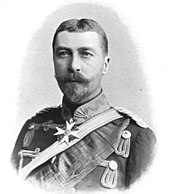Ernst Günther of Schleswig-Holstein-Sonderburg-Augustenburg


Duke Ernst Günther of Schleswig-Holstein (born August 11, 1863 in Dolzig ; † February 22, 1921 in Primkenau ) was a member of the Princely House of Schleswig-Holstein-Sonderburg-Augustenburg and brother-in-law of the last German Emperor Wilhelm II.
Life
Ernst Günther was the third son of Duke Friedrich VIII of Schleswig-Holstein-Sonderburg-Augustenburg (1829–1880) and his wife Princess Adelheid of Hohenlohe-Langenburg (1835–1900), the daughter of Prince Ernst I of Hohenlohe-Langenburg and his wife Feodora zu Leiningen . Ernst Günther's sister was the Empress Auguste Victoria .
In 1896, an affair between Ernst Günther and Baroness Johanna von Spitzemberg , the daughter of Salonière Hildegard von Spitzemberg , caused a stir at the imperial court. The planned marriage of the two, which according to the dynastic conventions would have been considered improper, failed due to the categorical objection of the imperial couple.
He had been a member of the Corps Borussia Bonn since 1884 .
marriage
On August 2, 1898, Ernst Günther married Princess Dorothea of Saxe-Coburg and Gotha (1881–1967), the only daughter of Prince Philipp (1844–1921) and Princess Louise of Belgium (1858–1924) and granddaughter of the Belgian King Leopold in Coburg II. Dorothea and Ernst Günther had no children. In 1920 they adopted Princess Marie Luise (1908–1969) and Prince Johann Georg von Schleswig-Holstein-Sonderburg-Glücksburg (1911–1941), son and daughter of Prince Albrecht of Schleswig-Holstein-Sonderburg-Glücksburg and Countess Ortrud von Isenburg and Büdingen.
The Duke made a name for himself with his extravagant sex life, which was scandalous for the time, which also included visits to brothels and which earned him the nickname “Duke Rammler” at court. However, given the rather prudish morals of the imperial court, the reports should be treated with a certain degree of caution. In the research, the assumption is expressed that Ernst Günther wrote the abuse letters of the Kotze affair .
publication
- Reform proposals in the Reich and in Prussia. Submitted to the state government in 1917. Hellmann, Glogau / Leipzig 1919.
Awards
- In 1892 he was awarded the Grand Cross of the Order of the Württemberg Crown .
literature
- Elizza heir: Auguste Victoria. The last German empress. Erfurt 2008, ISBN 978-3-86680-249-0 .
- John CG Röhl : Wilhelm II. The construction of the personal monarchy 1888–1900. Volume 2, CH Beck 2001.
- Olivier Defrance, Joseph van Loon: La fortune de Dora. Une petite-fille de Léopold II chez les nazis. Racine, Brussels 2013.
Individual evidence
- ↑ John Röhl : Kaiser Hof und Staat. Wilhelm II and German politics. Munich 1988. p. 106.
- ↑ Kösener corps lists 1910, 19 , 587.
- ↑ Chapter 4: The "Duke Rammler" Ernst Günther of Schleswig-Holstein. In: John CG Röhl : Volume 2: Wilhelm II. The structure of the personal monarchy 1888-1900. CH Beck, 2001, ISBN 978-3-406-48229-8 .
- ↑ Group sex in Grunewald , Die Zeit online, by Christian Staas, August 18, 2010.
- ↑ John Röhl: The puke affair. In: Wilhelm II. The structure of the personal monarchy. Munich 2001, pp. 751-753.
- ^ Court and State Handbook of the Kingdom of Württemberg. 1907, p. 30.
| personal data | |
|---|---|
| SURNAME | Ernst Günther of Schleswig-Holstein-Sonderburg-Augustenburg |
| ALTERNATIVE NAMES | Ernst Günther Duke of Schleswig-Holstein |
| BRIEF DESCRIPTION | Duke of Schleswig-Holstein |
| DATE OF BIRTH | August 11, 1863 |
| PLACE OF BIRTH | Dolzig |
| DATE OF DEATH | February 22, 1921 |
| Place of death | Primkenau |

